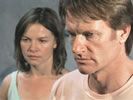Eye For Film >> Movies >> Look Both Ways (2005) Film Review
Weaving loosely connected lives around a random event is by no means a new cinematic device, so if a film's going to start stitching from such a familiar pattern it needs to pull in some fresh threads and catch our eye almost immediately. Don't and it will all unravel when compared to the more successful ensemble patchworks out there.
Thankfully, débuting writer/director Sarah Watt has a confident and inventive hand. From the first bold stitch she's sewing us into the lives of her characters and she never loses her stroke. Ultimately, she has created an a satisfying indie that won Australian Film Institute awards for Best Film, Best Director, Best Original Screenplay and Best Supporting Actor.

An unknown man is walking his dog along a dusty urban railroad track when his pet rushes in front of an oncoming freight train. Trying to save the dog, the owner is tragically killed on the rails. Awful and tense as this sounds, we hardly see anything, as Watt's focus is on those who lives are touched by this chance happening. Sensitive and plucky artist Meryl (Justine Clark) is walking home from the station, returning from her father's funeral, when she witnesses the death. Nick (William McInnes) is the photojournalist and Andy (Anthony Hayes) the reporter despatched by the local paper's editor (Andrew S Gilbert) to cover the story. The quiet and well-spoken Nick has just been diagnosed with advanced cancer, while the belligerent and self-deluding Andy's on-off girlfriend Anna (Lisa Flanaghan) tells him she's pregnant. Through Nick and Andy we also then meet the dead man's young partner (Daniella Farinacci) and the traumatised train driver (Andreas Sobik).
An unlikely relationship stiltedly develops between Meryl and Nick and this becomes the spine and heart of the film. However, Watts develops all her characters with enough thoroughness for this to be an effectively multi-stranded ensemble piece. Her intelligent script believably spirals around her characters whilst never outright telling us what they're thinking or feeling, rather giving us a collection of understandings through realistic dialogue and believably human flaws, and it's the better and more mature for it. The performances throughout are uniformly great, with the Jeanne Tripplehorn-resembling Clarke and Nathan Fillion-esque McInnes (Watts' real life partner) standing out.
Watts' direction is confident whilst never showy. Already an established artist and animator her invention comes from adroitly braiding animated sequences into the piece. Moving and jolting these provides exposition and context for the artist Meryl's character. Her morbidly depressed and grimly lonely thoughts contrast with her sparky outward persona and speak of mental tragedy, personal struggle and a person's inability to really communicate how they feel to others. Similarly, frantically edited flurries of photomontages convey photographer Nick's emotional journeys, psychological fears and soulfulness. This sounds trite and forced, but it honestly works right from the very start and becomes as important to the characters as the live action performances.
As everyone tries to deal, successfully or not, with the events that life throws at them, Look Both Ways asks some searching questions about a person's lot. Strong themes surface, such as death, fate, chance, having a right to a life and some good luck, earning and owing goodwill, realising consequence and death again. Meryl has self-persecuting visions of personal disaster and is grieving; Nick has covered war zones but now his body's the battleground; and Andy, often confined to the arts and obituaries section, dangerously waxes literary on suicide in today's modern lifestyles. Moribund notions indeed, but this is no doldrums piece and, aye, there's the rub. As an exploration of the human condition, this certainly leaves you feeling uplifted by the end, although it's never patronising, charmingly devoid of artificial sweeteners. If anything Look Both Ways reminds you that when something happens at a point in time, there are a myriad consequences and events flying off from it through any number of people, not just in the direction you're looking. This might not all just be about self-preservation when crossing the road.
Despite a smaller scope and even lesser budget, the film has an aroma of Magnolia about it, as much earth as Lantana, is more contemplative than Amores Perros and several cuts above the glib 11:14; Look Both Ways certainly holds its own. A real treat.
Reviewed on: 07 Sep 2006


















